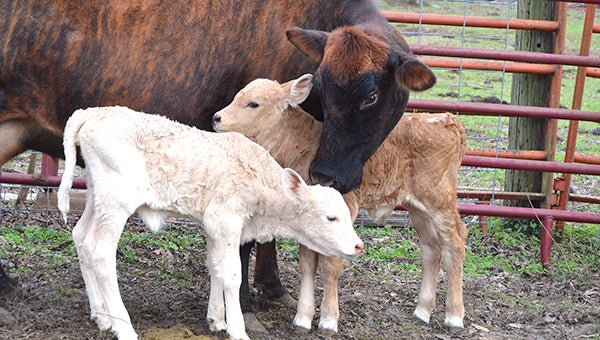TWINNING: Only 2nd time local farmer’s seen twins in 40+ years of cows
Published 12:10 am Friday, January 27, 2017

- Jim Riley said in 40 years or raising cattle, he’s only ever had a cow give birth to twins once before. | Erin Johnson Wingard/Star-News
Jim Riley has been involved with cattle operations on his farm on South Cotton Street his whole life. This week is only the second time he’s seen a cow give birth to twins.
“There’s been cows on this place at least 100 years,” he said. “My grandfather and my great-grandfather, I believe.”
As a teen, Riley helped his father with the family’s dairy farm, which he said is a grueling business.
“They’ve got to be milked twice a day, no matter what,” he said. “Summer, winter, Christmas … it doesn’t matter, you’ve got it to do.”
Growing up, he and his brother milked cows from 5 until 7 a.m. on school days. When he was preparing to enroll in Auburn, he said, he informed his father he didn’t plan to return to the dairy business.
Riley taught school here for 25 years, first at the vocational center and later at the middle school. He still lives on the family’s property, but he chose to raise beef cattle. And while they need attention, they are easier to care for than dairy cattle, he said.
In his herd of approximately 36 cattle, he currently has about 10 calves. Earlier this month, he was certain a heifer was carrying twins.
“It turned out to be the scrawniest calf ever,” he said.
But four days ago, he found a calf across the creek that runs on his property.
“There wasn’t a mama around, so I brought the calf back up to the pen,” he said. “It bleated once, and I heard the mama answer. I drove down where I could see her, and she had a another calf with her.”
He put all three in the catch pen, he said.
“She started mothering both of them,” he said. “That’s when I figured out she’d had twins.”
“You can have a thousand really calves out there, and a mama can pick out hers,” he said. “It’s just something amazing about nature.”
Riley said in the 40-some-odd years he’s been raising beef cattle, he’s only had twins once before.
“They were born outside the fence, and the mama never showed up,” he said. “I had to bottle feed them. But they loved each other like you would never believe.”
This time around, the calves are nursing, he said, although he’s watching closely to make sure.
“We’re not supposed to have cows in city limits, but we’re grandfathered in because we’ve been here so long,” Riley said. “They told me if I ever took them off the place, I couldn’t have them again.”
His cows are across South Cotton from Johnson Park, and often attract the attention of young ball players, he said.
“It’s just unique that we’re here,” he said. “People come over here to Johnson Park, and sit and look across. It’s just unique.”
The cattle occupy his time, he said, adding that all of the cows he raises are born on the place, with the exception of the bull.
In the summer, the herd grazes on the Rileys’ land, but he hasn’t had much luck with winter rye, so he buys hay in the winter. And while the unseasonably warm weather has green grass growing in his fields, it’s not nutritious enough to keep the cows going, he said.





